|
TRANSLATE THIS ARTICLE
Integral World: Exploring Theories of Everything
An independent forum for a critical discussion of the integral philosophy of Ken Wilber
 David Christopher Lane David Christopher Lane, Ph.D.
Professor of Philosophy, Mt. San Antonio College Lecturer in Religious Studies, California State University, Long Beach Author of Exposing Cults: When the Skeptical Mind Confronts the Mystical (New York and London: Garland Publishers, 1994) and The Radhasoami Tradition: A Critical History of Guru Succession (New York and London: Garland Publishers, 1992). SEE MORE ESSAYS WRITTEN BY DAVID LANE
Ken Wilber and
“Moronic” Evolution
The Religion of Tomorrow and
the misunderstanding of Emergence
David Lane
Make no mistake, Ken Wilber has a serious problem with evolution by natural selection since it fundamentally pulls apart his Integral house of cards.
It has been twenty years [1997] since I first wrote about Ken Wilber's misunderstanding and misrepresentation of Darwin's theory of evolution by natural selection. One would hope that in those intervening two decades Wilber would have at least learned not to keep peddling his mistaken caricature of biological evolution and how it actually works. But that hasn't happened since Wilber in his most recent book, The Religion of Tomorrow (2017), still persists in presenting a false picture of the current theory and in so doing propping up a straw man of his imagining so as to champion his own, not so subtle version of intelligent design.
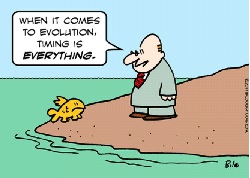
One can only wonder why he is so recalcitrant to admitting his errors. Yet, after reading his newest text, a weighty tome of over 800 pages, it became exceedingly obvious to me that Ken Wilber basically cannot accept how complexity can emerge from simpler processes without invoking a teleological drive behind its unfolding. Simply put, Wilber thinks it is “moronic” (his adjective) that blind processes could have led “From Bacteria to Bach” to cite Daniel Dennett's latest offering which serves as a nice rejoinder to all things Wilberish.
Moron is a term once used in psychology and psychiatry to denote mild intellectual disability. The term was closely tied with the American eugenics movement. Once the term became popularized, it fell out of use by the psychological community, as it was used more commonly as an insult than as a psychological term. It is similar to imbecile and idiot. ( Wikipedia)
Watch carefully how Wilber presents the neo-Darwinian argument, keeping a close eye on how he skips over the most elemental of details in the process:
“Rational reasons to believe in this miraculous spiritual dimension to Reality include the following: (a) the 'creative advance into novelty' that is demonstrated by evolution itself and is inexplicable by mere “chance mutation” (the evolution from strings to quarks to subatomic particles to atoms to small molecules to massively interconnected molecules to asexual cells and early organisms—just for starters—is an awful lot of evolution in a universe that is supposed to be 'running down' but can easily be seen as yet more evidence of creative Eros or Spirit-in-action, a 'self-organizing self-transcendent drive,' as Erich Jantsch put it.” (p. 498)
Wilber cannot imagine how novelty can be introduced by natural selection unless there is a creative and intelligent force that foreshadows it. In an extended section where he quotes Alfred North Whitehead, Wilber concludes that
“Without this novel or creative addition, nothing new would emerge anywhere in the universe, since the present would be totally determined and caused by the past.” (p. 218)
Yet, nowhere does Wilber provide his readers with a systematic and detailed explanation from physicists that completely contradicts his Eros saturated worldview, pretending that his “on top of it” summations are sufficient refutations when in point of details, they are nothing of the sort.
As Olivia P. Judson explains in “The Energy Expansions of Evolution” (with kudos to Frank Visser for the link), published in the prestigious journal Nature on April 28, 2017:
“Free energy is a universal requirement for life. It drives mechanical motion and chemical reactions—which in biology can change a cell or an organism. Over the course of Earth history, the harnessing of free energy by organisms has had a dramatic impact on the planetary environment. Yet the variety of free-energy sources available to living organisms has expanded over time. These expansions are consequences of events in the evolution of life, and they have mediated the transformation of the planet from an anoxic world that could support only microbial life, to one that boasts the rich geology and diversity of life present today.” (PDF, p. 1)
In a more technical passage, Judson explains how chemistry and the utilization of free energy allows for the emergence of differences in eukaryotes and how such would have emerged from simpler processes:
“In extant eukaryotes, organelles of mitochondrial origin take several different, but related, forms. Notably, only one—the 'standard' mitochondrion found, for example, in humans—requires oxygen. Three others are involved in forms of anaerobic metabolism; of these, two produce hydrogen. These observations fit with the hypothesis, advanced by Martin and colleagues, that the ancestral eukaryote resulted from a prior symbiotic association between a hydrogen-dependent archaeon and a metabolically flexible alphaproteobacterium that, in the absence of oxygen, lived anaerobically producing hydrogen, and in the presence of oxygen, lived aerobically. If this hypothesis is correct, the ancestral eukaryote could have been a facultative anaerobe, able to live in both oxic and anoxic environments. Such a scenario not only accounts for the different types of mitochondria seen in extant eukaryotes, but also for the fact that, today, species with mitochondria that produce ATP through anaerobic pathways are sprinkled across the eukaryotic tree while exhibiting a similar underlying biochemistry.” (PDF, p. 3)
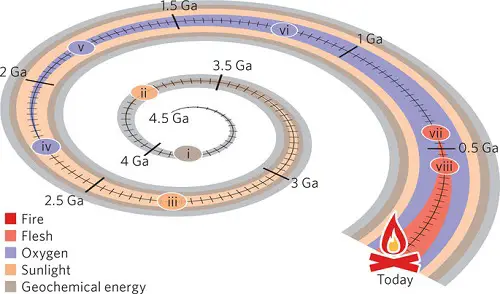
Figure 1: Key events during the energy expansions of evolution.
(Olivia P. Judson, "The energy expansions of evolution", Nature.com)
The emergence of novelty doesn't necessitate an overarching guiding hand where “Eros in action” is necessary for atoms to combine into molecules and they in turn into living cells. No, complexity can arise from very simple conditions given the right geometric environments, as has been pointed out throughout the various sciences—from quantum theory to molecular biology to neuroscience to computer informational systems.
Undoubtedly “the doctrine of emergence” is one of the great unifying concepts of science, since as Peter Watson points out in his illuminating text, Convergence: The Idea at the Heart of Science “that there are higher levels of organization in nature 'that are not predictable from properties found at 'lower' levels' and that 'the future will continue to bring forth unpredictable novelties.'”
But emergence and novelty don't necessitate a supernatural force to explain them. Combine two parts hydrogen with one part oxygen and you get water. Add a bit of wind upon a large surface of such liquid and you get waves. One doesn't have to invoke Neptune to explain oceanography; likewise one need not invoke Eros to explain how the “nuclei of deuterium and helium formed” just minutes after the Big Bang occurred 13.8 billion years ago.
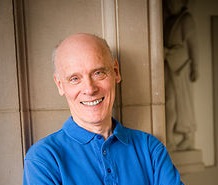 Creationist Hugh Ross: ‘Life did not
Creationist Hugh Ross: ‘Life did not
appear by natural forces alone.’
Wilber's invocation of “Eros” is merely a placeholder for a “God of the gaps” explanation and doesn't in any way help us better understand the cosmos at large. This is why he can with a straight face quote Hugh Ross as an astronomer and leave out that Ross is also a Biblical literalist and a strong advocate of [old earth] creationism. Hugh Ross, for instance, claims, “less than 1 chance in 10144 (trillion trillion trillion trillion trillion trillion trillion trillion trillion trillion trillion trillion) exists that even one such planet [a planet that supports life] would occur anywhere in the universe.” This, of course, is a statistical canard, no different in import than Fred Hoyle's famous junkyard tornado quip wherein he exclaimed, “The chance that higher life forms might have emerged in this way is comparable to the chance that a tornado sweeping through a junkyard might assemble a Boeing 747 from the materials therein.”
Not surprisingly, molecular biologists have turned Hoyle's analogy upside down and turned his fallacious reasoning into an object lesson about how evolution actually works since as John Maynard Smith rightly pointed out, “no biologist imagines that complex structures arise in a single step.”
The real problem with invoking probability theory when discussing the rarity of life on planet earth is that the statistics we employ are bounded by the limitations of our present day knowledge. What may seem implausible in the past becomes evidential with greater understanding in the future. This is particularly true the more we begin to see how vast our cosmos is and whether or not we live in a multiverse with an almost infinite number of mathematical and physical parameters.
More importantly, Charles Darwin was well aware of how improbable evolution by natural selection may appear at first, but given enough time and given a sieving medium (blind as it may be) such as natural selection coupled with variation and inheritance it algorithmically leads to design. In other words, design is a by-product within nature and not a conscious intention.
Stephen Wolfram captured this understanding in his book, A New Kind of Science, where he had a “Eureka” moment when studying cellular automata. He realized that from very simple computational rules a vast array of unimaginable and unpredictable complexity could arise without any conscious designer or intention whatsoever. He analogized that the universe we presently live in is the result of some very simple rudimentary computations played out over time and that none of it necessarily has anything to do with metaphysics or god.
But none of this apparently is convincing to Wilber, who, in his rush to dismiss natural selection, consistently misrepresents it instead of actually dealing with how it actually works and what it ultimately implies. Instead of dealing with the nuts and bolts of molecular mechanics, he indulges in philosophical sophistry and reifications by repeating his mantra of “transcend but include.” It may work as a New Age feel good slogan, but it has precious little to do with developing new breakthroughs in science.
Even then some organisms can develop complex structures simply by genetic drift or what is occasionally referred to as “neutral” evolution. As Carl Zimmer elaborates in Scientific American ["The Surprising Origins of Evolutionary Complexity"],
“The scenario that Gray proposes for the evolution of RNA editing goes like this: an enzyme mutates so that it can latch onto RNA and change certain nucleotides. This enzyme does not harm the cell, nor does it help it—at least not at first. Doing no harm, it persists. Later a harmful mutation occurs in a gene. Fortunately, the cell already has the RNA-binding enzyme, which can compensate for this mutation by editing the RNA. It shields the cell from the harm of the mutation, allowing the mutation to get passed down to the next generation and spread throughout the population. The evolution of this RNA-editing enzyme and the mutation it fixed was not driven by natural selection, Gray argues. Instead this extra layer of complexity evolved on its own—'neutrally.' Then, once it became widespread, there was no way to get rid of it.”
Note how the vast majority of working biologists never invoke “Eros” or any other mythic deity to explain complexity.
In either case, however, note how the vast majority of working biologists never invoke “Eros” or any other mythic deity to explain complexity. Why? Because there are a whole host of much more viable and workable explanations for how in a non-closed system order can emerge from chaos. Instead of a deep understanding of how chemistry evolved from physics, Wilber instead claims that “Eros in action” accounts for all that is new and novel in life, betraying once again any understanding of how emergence and novelty can result from simpler processes that don't need a divine being to engineer it.
The chief problem, besides his misreading of how emergence works in physical systems, is how loosely Ken Wilber uses the term “evolution” throughout his book. He too often conflates the term to mean something akin to progress towards an Omega destination whereas biologists tend not to invoke such teleological language since natural selection isn't a purposive force but an after the fact description of what can and will survive in a competing arena with a scarcity of resources. A good example of Wilber's confused use of the term is when he writes,
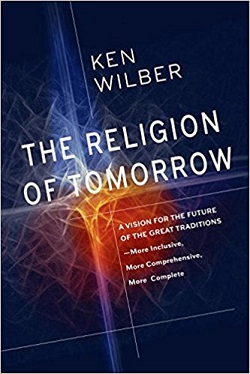 Hardcover, Shambhala, 2017, 806 pages.
Hardcover, Shambhala, 2017, 806 pages.
“But this is another reason that you—your thoughts, actions, feelings, communications, interactions, and behaviors—can directly contribute to evolution in all 4 quadrants, simply by adding something new and novel that hasn't existed before (including thoughts, feelings, ideas). If your addition is occurring on teal or turquoise (or higher), then it is open to becoming part of the very structure of that level of consciousness (Left Hand quadrants) and complexity (Right Hand quadrants). You don't need to have sex and pass on some fluky genetic mutation to somebody else who also had the same fluky mutation in order to contribute to evolution. If that were so, where did all the novelty and newness come from in the universe during the millions of years before sex was invented? (Atoms, after all, gave rise to molecules, a massively new and novel emergent, Eros in action, and molecules gave rise to living cells, a stunningly creative emergent, all without genetic mutation and natural selection but rather in a 'transcend and include' in mutual fit in all 4 quadrants.)
And doesn't that standard Darwinian view really mean that, for instance, today's geniuses who aren't sexually active, or those who have same-sex partners, or those whose profound mutations occur only in themselves and in nobody else are not going to contribute to actual evolution in the slightest? Another moronic story.” (p. 219)
Here as is usual with Wilber he is conflating cultural evolution with biological evolution. Sex selection alters the genotype and the phenotype of future generations, whereas the thoughts and ideas we share are memetic and are passed on in a cultural fashion. Ironically, the “fluky” aspect here is in Wilber's garbled understanding of what Darwinian evolution suggests and what it does not. To confuse genetics with memetics is to bastardize both.
Make no mistake, Ken Wilber has a serious problem with evolution by natural selection since it fundamentally pulls apart his Integral house of cards. It is therefore not surprising to hear him bombastically exclaim that
“The simple, outrageous improbability of an evolutionary unfolding to higher and higher and higher stages of unspeakable complexity continues to defy a mere 'chance and natural selection' explanation.” (p. 497)
What Wilber has yet to come to grips with is that “higher stages of unspeakable complexity” can indeed arise from simpler processes which have no intrinsic end goal in mind, since that (and not some Greek god of sexual desire and attraction) is at the heart of what Charles Darwin and Alfred Russel Wallace co-jointly discovered back in the 1850s and which has altered the whole course of scientific understanding to the present-day. An “integral” theory that relies on a mythic being (even if metaphorically) to explain one of the most fundamental features of the universe deserves to be lambasted. Or, is “moronic” too kind a description for what Wilber tries to pass off as scientific?
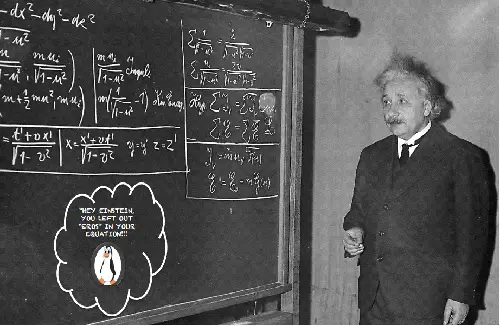
“Hey Einstein, you left out Eros in your equations!!!”
|
 David Christopher Lane, Ph.D.
Professor of Philosophy, Mt. San Antonio College Lecturer in Religious Studies, California State University, Long Beach Author of Exposing Cults: When the Skeptical Mind Confronts the Mystical (New York and London: Garland Publishers, 1994) and The Radhasoami Tradition: A Critical History of Guru Succession (New York and London: Garland Publishers, 1992).
David Christopher Lane, Ph.D.
Professor of Philosophy, Mt. San Antonio College Lecturer in Religious Studies, California State University, Long Beach Author of Exposing Cults: When the Skeptical Mind Confronts the Mystical (New York and London: Garland Publishers, 1994) and The Radhasoami Tradition: A Critical History of Guru Succession (New York and London: Garland Publishers, 1992).



